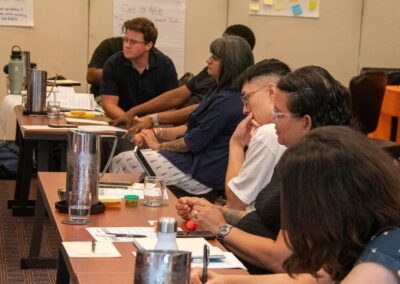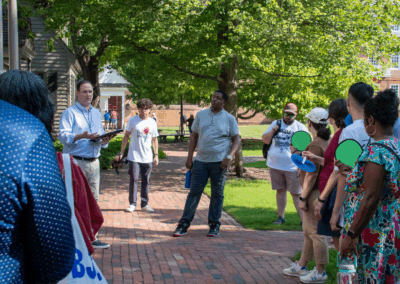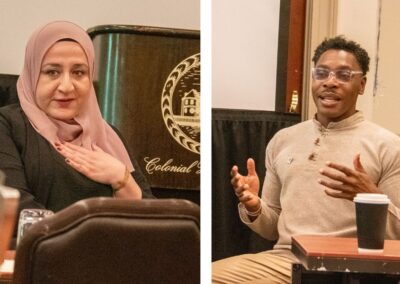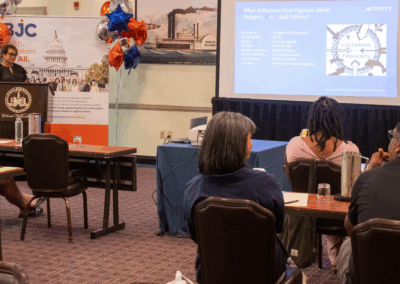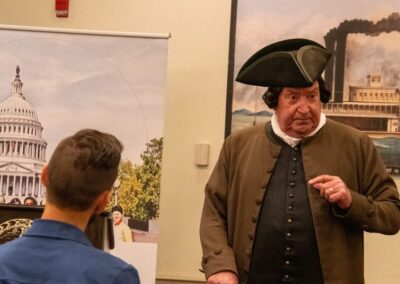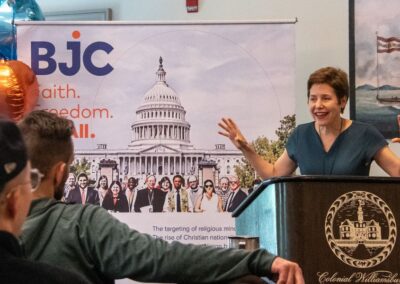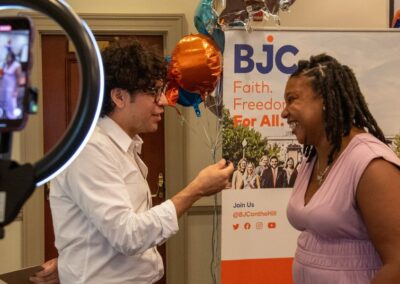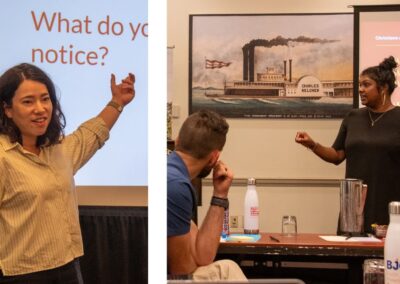2025 BJC Fellows Seminar brings number of advocates to 100
“The 2025 BJC Fellows represent the future of faith freedom advocacy,” said Dr. Sabrina Dent. “Their unique voices and experiences will help shape a more inclusive and equitable conversation around religious freedom.”
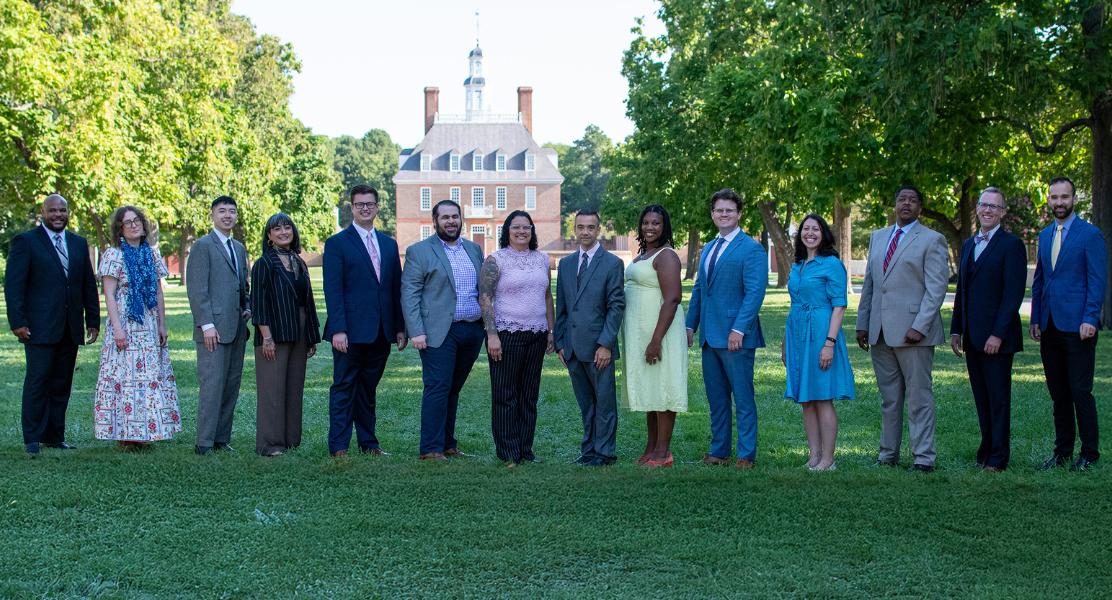
In the summer of 2015, the first class of BJC Fellows gathered in Colonial Williamsburg, Va., to learn about the theological, historical and legal foundations of religious freedom. Now, a decade later, we welcomed the 10th class of BJC Fellows to that same historic setting. What began as a small, pioneering program has blossomed into a robust network of 100 people — advocates, scholars, clergy and community leaders — who carry forward the vital work of protecting religious freedom for ALL people.
This year’s class brought together 14 young professionals from across the country, spanning from California to Massachusetts to Puerto Rico. Representing a range of professions — educators, clergy, nonprofit professionals, social workers and health care workers — the 2025 cohort highlights an important foundation of the program: that religious freedom isn’t just reserved for religious leaders and people of one — or any — faith. It intersects with issues across all sectors of society, and we all have a role to play in protecting it.
Over five hot summer days, the 2025 BJC Fellows participated in sessions on Christian nationalism, religious exemptions in our nation’s legal landscape, Baptist history and its deep connection with religious freedom for all, and much more. While many sessions are interactive lectures, they also help develop tangible skills, such as talking to the media or facilitating effective faith-based advocacy strategies.
The BJC Fellows also heard from other voices who are part of the fight for faith freedom for all. A session on religious freedom in the 21st century featured an insightful and honest conversation between Arthur “Ro” Fibby, a music industry veteran, activist, educator and former minister of music; and Hurunnessa Fariad, a Muslim American leader and advocate. In a conversation facilitated by BJC Research Fellow Jaziah Masters, they talked about what it means to fight for faith freedom for all as non-Christians in this country.
“Solidarity is not transactional. It cannot wait until our names are on the headline or our pain is at the center,” said 2025 BJC Fellow the Rev. Aaron Tinch after the session with Hurunnessa and Ro. “If I only show up for causes that promise me the favor of return, I’m not practicing justice — I’m managing alliances.”
The historic setting of Colonial Williamsburg served as a catalyst for deeper reflection of untold stories and marginalized voices. On the first full day of the seminar, the Rev. Dr. Nathan Taylor, executive director of the Virginia Baptist Historical Society and the Center for Baptist Heritage & Studies, and Dr. Corey D.B. Walker, dean of the Wake Forest University School of Divinity, led the 2025 BJC Fellows on a walking tour of Colonial Williamsburg. The tour was more than a list of historical stops — it also invited wrestling with how history is told and who gets to tell it.
They stopped at the First Baptist Church, one of the earliest African American congregations in the United States, to explore the roots of Black religious life and how enslaved and free African Americans forged spiritual communities as an act of both faith and resistance. At Bruton Parish Church, they examined the legacy of government establishment of religion and the role of dissenting Baptists in pushing for disestablishment in this country and broader protections of conscience. One of the last stops was at the Public Gaol (“Jail”), where the BJC Fellows learned that religious dissent was criminalized and how early Baptists, Presbyterians and others pushed forward, navigating the law in their pursuit of religious freedom for all.
“From the reflections we all shared at the end of the week together, I could tell these ghosts were deeply felt by all,” said 2025 BJC Fellow Harmeet Kaur Kamboj. “Now, how do we make them seen and heard in the ways they deserve?”
The Rev. Abigaíl Medina-Betancourt, another member of the class, reflected on the people not often mentioned in history books who were part of the community. “What can I do to make sure that 300 years from now, the tour guide shares their stories? How can I continue reading the stories that silences tell? Let’s start writing them.”
The five-day seminar also included other experts from BJC and beyond. Dr. Sabrina E. Dent, director of the BJC Center for Faith, Justice and Reconciliation and the leader of the BJC Fellows Program, led a session on religious pluralism in America. The Rev. Jennifer Hawks, who serves as the director of advocacy for the Cooperative Baptist Fellowship, led sessions on the legal foundations of religious freedom and religious exemptions. Melissa Rogers, the former director of the White House Office of Faith-based and Neighborhood Partnerships, spoke with the BJC Fellows about her book Faith in American Public Life and her time working in the Obama and Biden administrations. Following her session, Rogers engaged in a conversation with Dr. Walker on the theological and legal basis for religious freedom. The cohort also got a crash course on Christian nationalism and effective advocacy, featuring presentations from Joy Pettigrew, BJC’s community partnership manager, and Lisa Endean-Jacob, North Texas organizer for BJC’s Christians Against Christian Nationalism movement. BJC Communications Director Israel Igualate provided media training and some practice interview sessions for the cohort as well. The group also got to meet other BJC Fellows alumni who came to the session, creating new connections and expanding their networks.
And, no time in Colonial Williamsburg would be complete without hearing from historical interpreters, who interacted with the class as the people they portray. The BJC Fellows got to hear from and speak with a person portraying Patrick Henry, a founding father who was a staunch supporter of religious liberty throughout his political career, and the Rev. Gowan Pamphlet, an enslaved tavern worker who was also a preacher and the founder of Williamsburg’s First Baptist Church.
By the final day of seminar, the 2025 BJC Fellows emerged with an expanded vision of what religious liberty truly means. “What I really wish everyone knew is that religious freedom is not just about defending what I believe,” said 2025 BJC Fellow Kyle Zuber, “but it’s also about protecting the rights of others to believe differently, or not to believe at all.”
Each year, young professionals between the ages of 25 and 45 accepted into the program commit to more than just attending the seminar in Colonial Williamsburg; they pledge to advocate for religious liberty in their local communities and across the country. This commitment creates a ripple effect, as each person returns home equipped with knowledge as well as the tools and network necessary to effect real change.
The BJC Fellows Program is vital to the work of extending and defending faith freedom for all people. In an era marked by rising religious polarization, increasing challenges to pluralism and threats to the very foundations of religious liberty, this program stands as a symbol of hope and practical action.
“The 2025 BJC Fellows represent the future of faith freedom advocacy,” said Dr. Dent. “Their unique voices and experiences will help shape a more inclusive and equitable conversation around religious freedom.”
The BJC Fellows Program is possible thanks to our generous supporters. You can make a gift designated to programs like this from the BJC Center for Faith, Justice and Reconciliation at BJConline.org/Center.
This article originally appeared in the summer/fall 2025 edition of Report from the Capital. You can view it as a PDF or read a digital flip-through edition.

